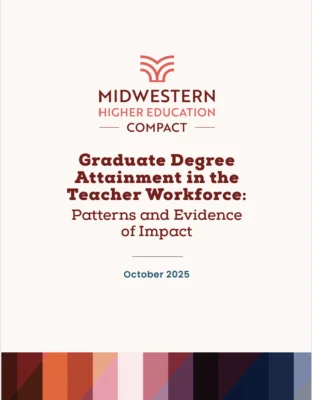Graduate Degree Attainment in the Teacher Workforce
Teachers play a critical role in shaping student success, and the attainment of a graduate degree, particularly a master’s degree, has been frequently regarded as an indicator of teacher effectiveness. Many states and school districts encourage or require graduate education, with 88% of large districts incorporating master’s degree attainment into teacher compensation structures (Nittler, 2018). However, researchers have often uncovered complex and mixed results on the impact of graduate degree attainment on student and teacher outcomes.
This report examines national and Midwest state trends in teacher graduate degree attainment with an emphasis on master’s degrees, highlighting differences by urbanization, school socioeconomic status, and program major. It also examines rates of major-subject congruence; that is, the alignment between a teacher’s graduate degree and their classroom teaching assignment. An overview is then provided of research on the effects of graduate education on student and teacher outcomes. Finally, the report presents several options to improve policies and outcomes related to teacher graduate education, including defining policy goals, improving major-subject congruence, strengthening graduate program quality, broadening effectiveness measures, and enhancing data collection.
This topic is important as states and districts work to strengthen teacher preparation, professional development, and overall instructional quality.

